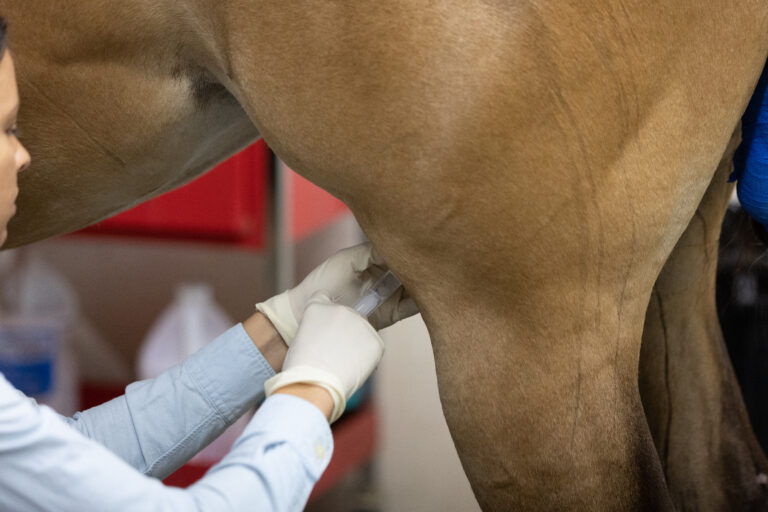This article originally appeared in the Summer 2025 issue of EquiManagement. Sign up here for a FREE subscription to EquiManagement’s quarterly digital or print magazine and any special issues.

“Given the right environmental factors and genetics, any horse can develop insulin dysfunction (ID),” said Erica Macon, MS, PAS, PhD, of Texas A&M University. During her presentation at the 2024 American Association of Equine Practitioners Convention, she described insulin dysregulation as a collective term that includes the possibility of three elements:
- 1. Insulin resistance.
- 2. Resting hyperinsulinemia.
- 3. Postprandial hyperinsulinemia.
Not every ID-affected horse experiences all three of these parameters. The concern is that insulin dysregulation of any kind sets up conditions for endocrinopathic laminitis. She stressed that prevention is key.
Macon said insulin dysregulation can present in horses with increased body condition scores, such as occurs with equine metabolic syndrome (EMS). Or, ID can develop in association with pituitary pars intermedia dysfunction (PPID). While not every PPID horse has ID, they are predisposed.
Grain Meals for ID Horses
In horses with ID, resting insulin is already elevated more than in normal, healthy horses. An ID horse that consumes a grain meal experiences postprandial hyperinsulinemia. While the threshold of insulin to incite laminitis is about 200-300 IU, Macon said the reality is different for every horse—we still don’t know how often or at what frequency insulin is elevated, even postprandially, to cause laminitis.
According to Macon, research shows that horses with insulin dysregulation do not respond similarly to different cereal grains when compared to healthy, non-ID individuals. In a study looking at nonstructural carbohydrate (NSC) thresholds for ID horses, researchers offered study horses sugar dextrose and starches in altered amounts. First, they kept the amount of sugar dextrose in the diet constant while increasing corn and oat starch. Then, a diet change held starch constant and increased the sugar. The results show that ID horses have lower starch digestion thresholds compared to sugar—likely because horses don’t produce much amylase due to their evolutionary intake of predominantly forage.
A threshold of 0.1 NSC/kg is considered relevant if horses are fed sugar and starches.
Forage for ID Horses
The most important dietary component for intestinal and endocrine health of horses is forage. A study comparing NSCs for 10.9% soaked hay, 16% dry hay, and 18.5% haylage found that if NSCs exceed 10%, the horses respond with large increases in insulin. Hay pellets do not elicit drastic insulin responses compared to feeding oat groats or whole oats. Macon suggested this might be because NSCs in hay pellets attach to structural fibers to bypass the foregut and, therefore, do not influence the insulin response.
Of great significance, said Macon, is that not every purported “low-NSC” feed is low in NSCs. For instance, orchard grass hay, while a desirable forage for many of its constituents, contains a lot of sugar. Some high-protein ration balancers also elicit increased insulin responses—she said it might be appropriate to halve the ration in some cases.
Macon said slow feeders and balls or rocks placed in food buckets do not result in different insulin responses despite lengthening the horse’s food consumption time. Haynet webbing size can affect consumption time, with the smallest holes of 1 ¼ inches being ideal for slowing consumption. However, more studies are needed to see if increased eating duration can lower insulin responses. Grazing muzzles result in a 30-45% reduction in pasture consumption, which can help minimize horses’ ingestion of rich pasture plants.
Final Thoughts
Macon’s take-home messages stress that what you feed a horse directly impacts his postprandial insulin responses: An elevation in insulin past a threshold can stimulate an episode of endocrinopathic laminitis. She reminds us that not all low-NSC feeds are equal, so it is important to calculate concentrations for each horse. Limiting total NSC intake to around 0.1 g/kg BW helps keep insulin below the laminitic threshold for ID horses.
Related Reading
- Managing EMS and ID Horses
- Equine Endocrinopathies: Is it ID, PPID, or Both?
- Track-Grazing Better for Equine Welfare Than Strip-Grazing
Stay in the know! Sign up for EquiManagement’s FREE weekly newsletters to get the latest equine research, disease alerts, and vet practice updates delivered straight to your inbox.

![[Aggregator] Downloaded image for imported item #18782](https://s3.amazonaws.com/wp-s3-equimanagement.com/wp-content/uploads/2025/11/03125751/EDCC-Unbranded-13-scaled-1-768x512.jpeg)


